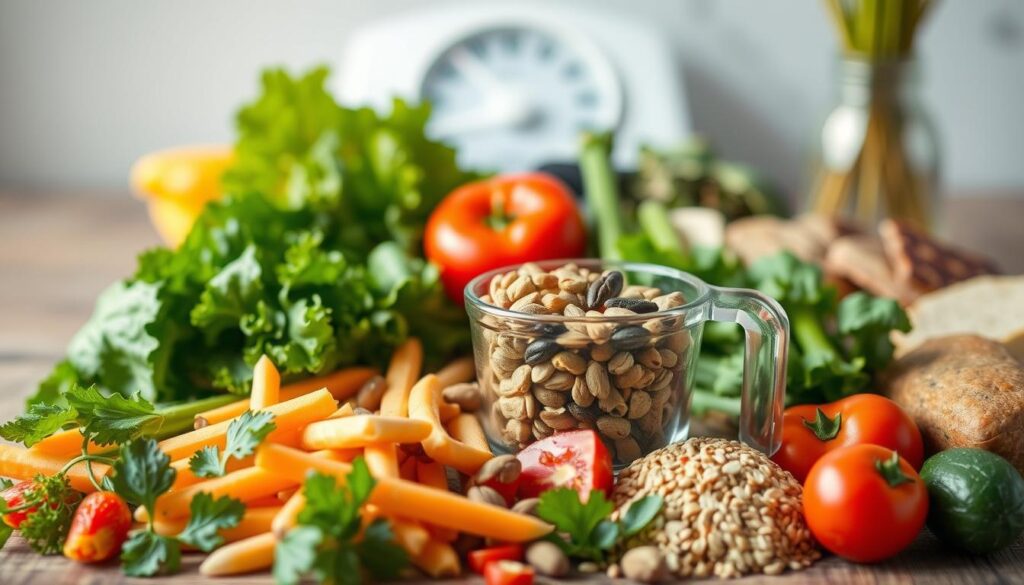Losing weight can be tough, but it starts with knowing your calorie intake. You need to think about your age, sex, weight, height, and how active you are. Women usually need at least 1,600 calories a day. Men need at least 2,000 calories for basic needs.
To lose weight safely, you must create a calorie deficit. But, it’s important to do this in a way that keeps you healthy. Knowing your daily calorie needs helps you plan your diet right. This way, you can reach your weight loss goals. so how many calories to lose weight?
Understanding Caloric Deficits (how many calories to lose weight)
Losing weight is more than just dieting; it’s about creating a caloric deficit. This means your body burns more calories than it takes in, leading to weight loss. It’s a key concept for anyone wanting to lose weight effectively.
What is a Caloric Deficit?
A caloric deficit happens when you eat fewer calories than your body needs. This forces your body to use fat for energy, causing weight loss. For example, eating 2,000 calories a day when your body needs 2,500 creates a 500-calorie deficit.
Creating a caloric deficit can be done through diet, exercise, or both. Cutting your daily calories by 500 is a safe way to lose about 1 pound a week.
Importance of Tracking Calories
Tracking your calorie intake is crucial for a caloric deficit. Apps and tools can help monitor your food and activity. This way, you can adjust your diet and exercise to meet your weight loss goals.
A study in the Journal of the Academy of Nutrition and Dietetics shows tracking food is key to weight loss. A registered dietitian says, “Tracking calories is simple; it’s about being mindful of what you eat and making smart choices.”
“The key to successful weight loss is not just about cutting calories but making sustainable lifestyle changes.”
Here’s a table showing how caloric deficits affect weight loss:
| Daily Caloric Deficit | Projected Weekly Weight Loss | Projected Monthly Weight Loss |
|---|---|---|
| 250 calories | 0.5 pounds | 2 pounds |
| 500 calories | 1 pound | 4 pounds |
| 1000 calories | 2 pounds | 8 pounds |
By understanding and using a caloric deficit, you can reach your weight loss goals in a healthy way.
Calculating Your Daily Caloric Needs
how many calories to lose weight
Finding out how many calories you need each day is crucial for losing weight. Your age, sex, weight, height, and how active you are all play a part. Knowing this helps you keep your weight in check.
how many calories to lose weight
Using the Harris-Benedict Equation
how many calories to lose weight
The Harris-Benedict Equation is a common way to figure out your basal metabolic rate (BMR). This is how many calories your body burns when you’re just sitting there. The formula is different for men and women:
- For men: BMR = 66 + (6.2 * weight in lbs) + (12.7 * height in inches) – (6.8 * age in years)
- For women: BMR = 655 + (4.35 * weight in lbs) + (4.7 * height in inches) – (4.7 * age in years)
To find your daily caloric needs, multiply your BMR by an activity factor. This factor depends on how much you move around. For example, if you’re pretty still, multiply by 1.2. If you’re active, it might be 1.55.
Factors Influencing Caloric Needs
how many calories to lose weight
Many things can change how many calories you need. It’s important to think about these when you’re planning your meals. These include:
- Age: As you get older, your metabolism slows down, so you need fewer calories.
- Sex: Men usually need more calories because they have more muscle.
- Weight and Height: Bigger people need more calories.
- Activity Level: If you’re more active, you burn more calories.
- Overall Health: Some health issues can change how many calories you need.
By knowing these factors and using the Harris-Benedict Equation, you can guess how many calories you need each day. This helps you plan a diet that helps you lose weight. A lose weight calorie calculator can make this easier.
Finding Your Ideal Caloric Intake for Weight Loss
how many calories to lose weight
Finding the right balance of calories is key to achieving your weight loss goals. To determine your ideal caloric intake, you need to consider several factors. These include your current weight, activity level, and weight loss goals.
General Guidelines for Weight Loss
how many calories to lose weight
Women generally need at least 1,600 calories per day, and men need at least 2,000 calories for basic bodily functions. For weight loss, a daily caloric intake of 1,200-1,600 calories is often recommended as a starting point. However, this can vary based on individual factors such as age, sex, weight, and activity level.
Key considerations for determining your daily caloric needs include:
- Your current weight and body composition
- Your activity level (sedentary, lightly active, moderately active, very active)
- Your weight loss goals (how much weight you want to lose and at what rate)
Setting Realistic Caloric Goals
how many calories to lose weight
Setting realistic caloric goals is crucial for successful weight loss. Aiming to lose 1-2 pounds per week is considered safe and sustainable. To achieve this, you need to create a caloric deficit by consuming fewer calories than your body burns.
A daily caloric deficit of 500-1000 calories can help you lose 1-2 pounds per week. This can be achieved through a combination of reducing your daily caloric intake and increasing your physical activity.
Tips for setting realistic caloric goals:
- Start with a small caloric deficit and adjust as needed
- Monitor your progress regularly
- Make sure you’re getting enough nutrients while cutting calories
By following these guidelines and setting realistic caloric goals, you can achieve a healthy and sustainable weight loss.
The Role of Macronutrients in Weight Loss
how many calories to lose weight
Macronutrients like carbohydrates, proteins, and fats are key for losing weight. They are important for health and play a big role in weight loss.
Balancing Carbohydrates, Proteins, and Fats
It’s important to balance carbs, proteins, and fats for weight loss. Proteins help keep muscle mass and make you feel full. Carbs give energy, and fats are good for hormones and health.
Think about your needs and likes when balancing these. If you’re very active, you might need more carbs for energy. If you want to build muscle, eating more protein is a good idea.

how many calories to lose weight
How Macronutrients Affect Caloric Intake
Macronutrients affect how many calories you eat, which is key for losing weight. Proteins and carbs have 4 calories per gram, while fats have 9.
Knowing how to balance these can help control calories. For example, eating more protein can make you eat fewer calories overall.
Also, the quality of these nutrients matters. Eating complex carbs, lean proteins, and healthy fats can help you lose weight better.
Importance of Portion Control
how many calories to lose weight
Starting your weight loss journey means learning about portion control. It’s key to keep your calorie intake in check. This directly helps you lose weight.
Practical Tips for Effective Portion Control
how many calories to lose weight
Here are some tips to control your portions:
- Use smaller plates to eat less.
- Measure food with cups or a scale.
- Avoid eating from packages to prevent overeating.
- Pay attention to serving sizes on labels.
Tools to Help with Portion Sizes
Here are tools to help you measure portions:
- Food Scales: Great for weighing food.
- Measuring Cups: Perfect for measuring volumes of foods like cereals and liquids.
- Portion Control Plates: These plates have sections for different foods, helping you eat balanced meals.
Using these tools and tips daily can help you eat healthier. This will help you reach your weight loss goals.
Incorporating Exercise into Your Weight Loss Plan
how many calories to lose weight
Exercise is key to a good weight loss plan. It burns calories and builds muscle. Adding physical activity to your day boosts your health and wellbeing.

how many calories to lose weight
Regular exercise keeps muscle mass while you lose weight. Muscle burns more calories than fat, even when you’re not moving. This means more muscle means a faster metabolism, helping you lose weight better.
Calories Burned through Exercise
The calories burned by exercise depend on the type, intensity, and how long you do it. High-intensity activities like running burn more calories than low-intensity ones like walking. Knowing how many calories different exercises burn helps plan your workouts better.
Here’s a rough idea of calories burned per hour for a 154-pound person:
- Light walking: 240 calories
- Jogging: 600 calories
- Swimming (moderate pace): 450 calories
- Cycling (vigorous): 800 calories
Types of Workouts to Maximize Weight Loss
A good exercise routine has cardio, strength training, and flexibility exercises. Cardio, like cycling or swimming, burns calories and improves heart health. Strength training builds muscle, which increases your resting metabolic rate.
Combining different workouts keeps your routine interesting and prevents getting stuck. Try alternating between cardio and strength training days. High-intensity interval training (HIIT) is also great for weight loss, with short intense exercises followed by rest.
Understanding exercise’s role in weight loss and mixing up your workouts leads to a solid fitness plan. This plan supports your weight loss goals and boosts your health.
Making Sustainable Changes to Your Eating Habits
how many calories to lose weight
For lasting weight loss, adopting healthy eating habits is key. It’s not just about cutting calories. It’s about changing how you view food.
Strategies for Healthy Eating
Eating whole, nutrient-rich foods is vital. Include fruits and vegetables, lean proteins, and whole grains in your diet. This supports your weight loss and boosts your health.
Practicing mindful eating is also important. Listen to your hunger and fullness signals. Eat slowly and enjoy your food. This can prevent overeating and make you happier with your meals.
Avoiding Dieting Pitfalls
Stay away from restrictive diets. They might help you lose weight quickly but can be harmful in the long run. Instead, make small, lasting changes to your diet.
Don’t follow a one-size-fits-all diet. Everyone’s nutritional needs are different. Get a personalized diet plan from a healthcare professional or a registered dietitian.
By avoiding common dieting mistakes and focusing on healthy habits, you can achieve lasting weight loss. This will also improve your overall health and well-being.
Monitoring Your Progress
Tracking weight loss is more than just weighing yourself. It’s about looking at many parts of your journey. This helps you see what’s working and what needs work. Regular tracking keeps you motivated and helps you make smart choices about diet and exercise.
How to Track Weight Loss Effectively
To track your weight loss well, use a few methods. A food diary or a mobile app can track your food and calories. Also, keep an eye on your physical activity and weight regularly. This gives you important data on your progress.
Measuring your body fat and tracking body measurements is also helpful. These show more about your weight loss than just the scale.
| Tracking Method | Description | Benefits |
|---|---|---|
| Food Diary | Record daily food intake | Helps monitor eating habits and caloric intake |
| Mobile App | Track food, exercise, and weight | Convenient and accessible, provides comprehensive data |
| Body Measurements | Track changes in body size | Provides visual evidence of progress, motivates continued effort |
Adjusting Caloric Intake Based on Progress
how many calories to lose weight
If you’re not losing weight as you want, you might need to eat fewer calories or move more. If you’re losing weight too fast, you might need to eat a bit more. This ensures you get enough nutrients.
Looking at your progress data often helps you adjust your diet and exercise. Being flexible is crucial for successful weight loss. It lets you adapt to your body’s changes and stay on track with your goals.
The Impact of Sleep and Stress on Weight Loss
how many calories to lose weight
Weight loss isn’t just about diet and exercise. Sleep and stress also play big roles. Poor sleep and high stress levels can really slow down your weight loss.
Let’s look at how sleep affects weight loss. Studies show that not enough sleep messes with hunger hormones. This can make you eat more, making it tough to lose weight.
Sleep-Weight Loss Connection
The link between sleep and weight loss is strong. Poor sleep quality and duration can slow down your metabolism. When you’re tired, you might crave more calories and find it harder to stick to your diet.
A study in the International Journal of Obesity found a big difference. People who slept less than 5 hours a night lost less fat than those who slept 8 hours or more. This shows how important sleep is for losing weight.
Managing Stress for Weight Management
how many calories to lose weight
High stress can also hurt your weight loss goals. Stress makes your body store fat around your belly. Chronic stress can lead to eating too much and making bad food choices.
It’s key to manage stress well for weight management. Meditation, yoga, and deep breathing exercises can help lower stress. Adding these to your daily routine can help with weight loss and overall health.
“Stress is a major contributor to weight gain and obesity. Finding healthy ways to manage stress is essential for achieving and maintaining weight loss.”
Understanding the role of sleep and stress in weight loss helps you approach it holistically. Focus on good sleep and stress management. This can greatly improve your weight loss efforts and keep you healthy.
Consulting Healthcare Professionals
how many calories to lose weight
Trying to lose weight? It’s smart to get help from healthcare experts. They offer advice and support for a healthy weight loss journey.
Nutritionist Guidance
Registered dietitians or nutritionists are great for diet help. They create meal plans that fit your life and goals. This is especially useful if you’re having trouble with a balanced diet.
Benefits of Expert Advice
Healthcare professionals bring many benefits. They share proven information and support you every step of the way. Working with them helps you understand how to keep a healthy weight and avoid chronic diseases.


